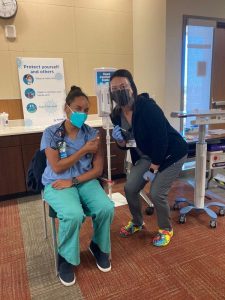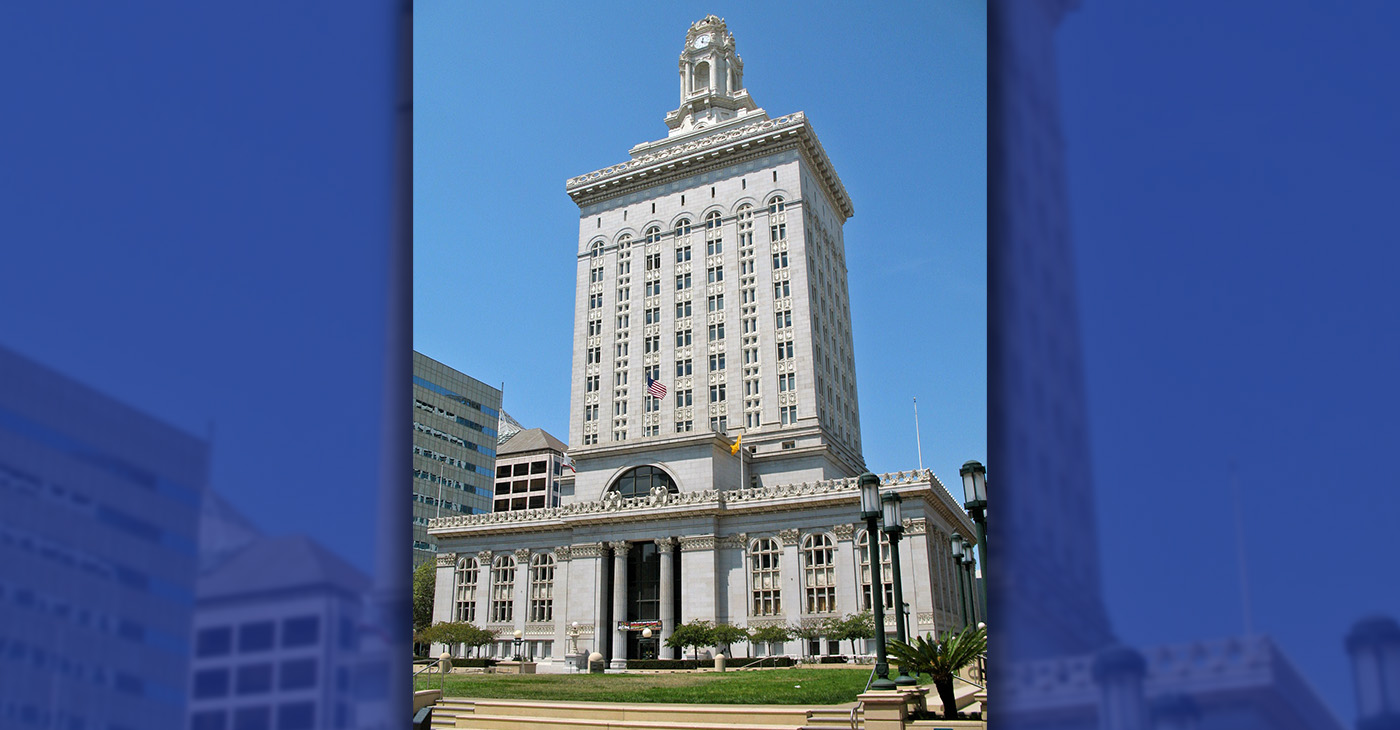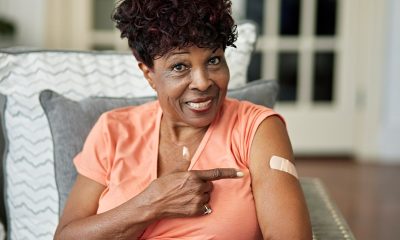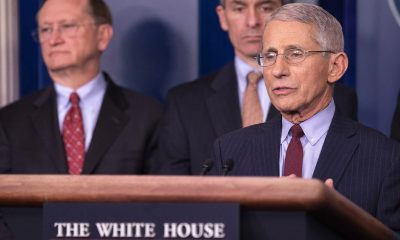COVID-19
Bay Area Medical Workers Share Views on COVID-19 Vaccine
To not get the vaccine would be giving up an opportunity to protect ourselves, our health, and the health and livelihood of our friends and community


Angela White (seated) receives a vaccine shot from Adrian Cabrera, RN of Alameda Health System’s Employee Health Department. Phot contributed.
Thirty-seven-year-old Angela White of Oakland didn’t even flinch when she was administered the COVID-19 vaccine. “I don’t remember when the needle was inserted in my arm after the nurse said ‘you’re done’,” said White. “It was quick and painless.”
White, an Emergency Medicine physician at Oakland’s Highland Hospital since 2016, is one of the few Black doctors working in Highland’s emergency room. She took the vaccine on December 18 and is looking forward to her second vaccine shot on Jan. 9, 2021. As of this writing, White has not experienced any major side effects.
“There was a small muscle in my arm that was sore for a day but aside from that, I’ve felt pretty normal,” added White. “As a doctor who cares for COVID patients I took the vaccine because I’m exposed to COVID patients on a daily basis and I wanted to protect myself, my family and my community. I wanted to show people that they have nothing to fear by taking the vaccine.”
“This is not a trial, a test or study on any particular group,” said White. “I think it is critically important for our community to take the vaccine. We’re essential workers who are more likely to be impacted by COVID-19. To not get the vaccine would be giving up an opportunity to protect ourselves, our health, and the health and livelihood of our friends and community.”
“I think using the vaccine is another way of protecting me, in addition to wearing a mask and face shield at work, I also practice social distancing. It’s just one more step that’s going to make me, my family and my community safer, and I highly recommend people take the vaccine if they are eligible.”
Physician and immunologist, Dr. Anthony Fauci, who has served as director of the National Institute of Allergy and Infectious Diseases since 1984, said that when the opportunity becomes available, getting the vaccine from either Pfizer-BioNTech or Moderna is the smart thing to do.
So far, there are more than 19 million cases of COVID-19 in the U.S., which has resulted in more than 330,000 deaths. In California, there are 2.19 million cases and more than 24,400 deaths.
Fauci has previously shared his concern that “the disproportionate rate of infections on people of color is staggering, and ‘herd-immunity’ will not be accomplished until everyone buys in and participates by taking the vaccine. This is especially true for African-Americans who, more so than other races, suffer from chronic lung and heart disease, diabetes and hypertension.”
Gregory Givens, a registered nurse who has worked for 15 years as a medical professional in San Francisco, believes the vaccine is not the only answer. “I believe in health prevention more so than treatment,” said Givens. “If people take better care of themselves and their bodies, they can avoid getting sick.”
“There are alternate means and ways to help people stay healthy, such as taking vitamins, getting plenty of rest, taking fluids, exercise more, take natural herbs, use common sense and avoid activities that would put their health at risk.:
Givens said his “job is to educate individuals on how to stay healthy. Before taking the vaccine, I think people should weigh the pros and cons and understand the difference between establishing and maintaining good health habits rather than relying on a product that is produced in a lab. There are more ways to cure people than (conventional) medicine.”
Santana Robinson, an EEG technician from UCSF Benioff Children’s Hospital Oakland, received the vaccine and compared it to any other flu-like shot she has received. “I had the normal reaction most people get after taking a vaccine shot, which basically is a sore arm the next day, but no side effects to speak of,” said Robinson.
During her six-year tenure at Benioff, Robinson’s primary responsibility has been to monitor brainwave activity on patients who’ve had seizures or head trauma. When asked why she took the shot, she said it was her responsibility.
“I took the vaccine because I didn’t want to get sick,” said Robinson. “I don’t want my family to get sick and I don’t want anyone else to get sick. I was hesitant at first because it was so new, but never for one moment was I not going to take it.”
She said that being one of the first to do anything is always a “little bit scary.”
“I’ve talked with several co-workers who are people of color about taking the vaccine and they’ve said ‘no way.’ They told me I was crazy to take it,” Robinson said.
To her, this resistance is “very frustrating because people in minority communities are more adversely affected by the virus than other groups. If anyone needs the vaccine most, it’s people in the Black and brown communities.
“From everything I’ve heard, it’s hurting us a lot more than other races of people and if someone is handing you a lifeline, you should take advantage of it. I will continue to be an advocate and encourage people to participate and take the vaccine,” Robinson.
Activism
ESSAY: Technology and Medicine, a Primary Care Point of View
The COVID-19 pandemic, for example, restricted millions of people to their homes, which required reliance on the internet for communication and information. Personal internet searches became essential to understanding information about COVID, human physiology, symptoms, and keeping up with vaccine updates. However, this increase in independent online research resulted in people accessing more misinformation circulating on the internet. This posed a challenge for medical providers trying to treat patients according to research-based guidelines. With so much information within reach, it was difficult for providers to help their patients distinguish between legitimate evidence-based sources and opinion, speculation, and fabrication.

Dr. Adia Scrubb
Special to California Black Media Partners
Technology has enhanced communication between medical professionals and patients; improved patient care management; and eased access to care and information, benefiting both patients and medical clinicians.
However, despite the ease and many conveniences these patient care improvements have ushered in, adequate patient care still includes physician supervision, examinations, and interaction, which present challenges for keeping up with demands on the healthcare system and accurate patient education.
Technology has made more educational resources available at our fingertips, and it has created independence for those who want to know more about their bodies.
The COVID-19 pandemic, for example, restricted millions of people to their homes, which required reliance on the internet for communication and information. Personal internet searches became essential to understanding information about COVID, human physiology, symptoms, and keeping up with vaccine updates. However, this increase in independent online research resulted in people accessing more misinformation circulating on the internet. This posed a challenge for medical providers trying to treat patients according to research-based guidelines. With so much information within reach, it was difficult for providers to help their patients distinguish between legitimate evidence-based sources and opinion, speculation, and fabrication.
Nowadays, patients continuously arm themselves with medical information and challenge clinicians with the research they gather from internet sources to advocate for themselves and their care. This often leaves medical professionals with the complex task of navigating challenging discussions, pointing patients to validated and verified medical information, and following evidence-based medical guidelines for treatment.
Reviewing information before an appointment can certainly make an office visit much more productive, but it is essential to acknowledge the possible bias and limitations of internet searches. Consideration of the author, source, and date of the information may help determine its validity.
Furthermore, simply asking medical professionals for their preferred patient information resources will direct patients to safe and validated information that is in line with standards of care practices. This can help patients better understand the recommendations from their doctors and streamline their internet searches.
Access to individual online medical record information, such as blood tests, MRI reports, and office visit notes, has been a significant expansion of technology in medicine. This digitization of medical information enables and positions patients to take a leading role in managing their care. What used to be multiple sheets of paper in a large file folder is now a click away at any time. Despite these benefits, instant access can be overwhelming for both patients and medical providers, especially since patients, in many instances, can receive their test results online before the physician has had the opportunity to review them.
Patients may review the office visit notes or their lab results out of context or misinterpret information, which can lead to anxiety, confusion, and fear. Clinicians are put in a difficult position when they are not able to suddenly break away from their scheduled office visits to reassure an unscheduled patient about their results and next steps.
Medical providers have tools to assist with identifying sensitive results that need urgent review, and efforts are made to notify anxious patients as soon as possible. However, a patient can be proactive in scheduling a follow-up visit ahead of time to review results with their provider specifically. This can help patients avoid the stress of suddenly trying to get a hold of their doctor when dealing with unclear or concerning results. Normal test results often don’t require explanation, but allowing several days for your provider to work through hundreds of test results before sending messages requesting clarification will help medical professionals prioritize their responses to test results based on medical urgency.
Technological improvements such as online messaging and video/telephone appointments have made access to care much easier both for patients and clinicians. Telephone and video visits have been especially beneficial for patients who are elderly, disabled, or do not have access to transportation. However, the increase — and ease of — access has created much higher demand for physician time both during and outside of the office visit. Test results, patient messages, insurance forms, emails, and medication requests are all pouring in while providers conduct their daily scheduled appointments. Thus, very little time is left in the day for a clinician to respond to every email, fill out every form, and review every lab result when they are responsible for 1,800 or more patients.
This situation, unfortunately, creates a perceived delay in response in a culture where an instant response is expected from messaging and phone calls. But the reality is that the medical provider is constantly playing catch up to thousands of inquiries due to the around-the-clock online access patients now have.
Patients can make the most of their experience and their physician’s time by taking the time to learn their physician’s communication preferences. Despite the multiple modalities of access (telephone, email, video, in-person), a medical provider will have a preferred method of communication with their patients. Some may ask their patients to make an appointment to explain a complex topic, instead of responding to multiple messages. Others may prefer to communicate via phone call if they have to deliver bad news.
There will likely be more medical providers who prefer to communicate only through email or video appointments as remote work becomes more common. If a patient’s communication preferences align with their physician’s preferences, it will create a stronger patient-doctor relationship and foster more effective and impactful communication.
The expansion of technology in medicine has fostered better collaboration, communication, and education between patients and their medical professionals. Combining electronic resources with rapport, mutual respect, and trust for providers will help patients navigate this new landscape of healthcare.
About the Author
Dr. Adia Scrubb, MD, MPP, is a Board-Certified Family Medicine Physician currently practicing in Solano County.
Alameda County
After Years of Working Remotely, Oakland Requires All City Employees to Return to Office by April 7
City Administrator Jestin Johnson recently told city unions that he is ending Oakland’s telecommuting program. The new policy will require employees to come to work at least four days a week. These new regulations go into effect on Feb. 18 for non-union department heads, assistant and deputy directors, managers, and supervisors. All other employees must be back at work by April 7.

By Post Staff
The City Oakland is requiring all employees to return to the office, thereby ending the telecommuting policy established during the pandemic that has left some City Hall departments understaffed.
City Administrator Jestin Johnson recently told city unions that he is ending Oakland’s telecommuting program. The new policy will require employees to come to work at least four days a week.
These new regulations go into effect on Feb. 18 for non-union department heads, assistant and deputy directors, managers, and supervisors. All other employees must be back at work by April 7.
The administration may still grant the right to work remotely on a case-by-case basis.
In his memo to city unions, Johnson said former President Joe Biden had declared an end to the pandemic in September 2022, and that since then, “We have collectively moved into newer, safer health conditions.”
Johnson said “multiple departments” already have all their staff back in the office or workplace.
The City’s COVID-era policy, enacted in September 2021, was designed to reduce the spread of the debilitating and potentially fatal virus.
Many cities and companies across the country are now ending their pandemic-related remote work policies. Locally, mayoral candidate Loren Taylor in a press conference made the policy a central issue in his campaign for mayor.
City Hall reopened for in-person meetings two years ago, and the city’s decision to end remote work occurred before Taylor’s press conference.
At an endorsement meeting last Saturday of the John George Democratic Club, mayoral candidate Barbara Lee said she agreed that city workers should return to the job.
At the same time, she said, the city should allow employees time to readjust their lives, which were disrupted by the pandemic, and should recognize individual needs, taking care to maintain staff morale.
The John George club endorsed Lee for Mayor and Charlene Wang for City Council representative for District 2. The club also voted to take no position on the sales tax measure that will be on the April 15 ballot.
Activism
Freddie Ray Turner, 75
Fred enjoyed a 27-year career (1972-1999) with the Oakland Unified School District. Starting as a classroom teacher, he went on to serve as a vice principal, principal and retired as director of Student Services. But retirement was not in the cards for Fred. He went on to serve as the Fremont Unified School District’s director of Pupil Services for five years, retiring in 2004.

Special to The Post
Freddie Ray Turner was born in Mesa, Arizona, on July 15, 1949, the youngest of Carlanthe and Jimmie Turner’s seven children. Fred attended the Chandler public schools and graduated high school in 1966. He earned a Bachelor of Arts degree in Drama and Spanish from Arizona State University in Tempe, Arizona.
Relocated to the Bay Area, he continued his education, and earned a master’s degree in Education Administration from California State University-Hayward.
Fred enjoyed a 27-year career (1972-1999) with the Oakland Unified School District. Starting as a classroom teacher, he went on to serve as a vice principal, principal and retired as director of Student Services. But retirement was not in the cards for Fred. He went on to serve as the Fremont Unified School District’s director of Pupil Services for five years, retiring in 2004.
Throughout his life, Fred traveled the world. He didn’t just have a “travel bug,” Fred was a travel bug. He graduated from overnight stays in youth hostels in Paris, Rome, and Madrid to vacationing in much finer accommodations in Kenya, Turkey, China, Japan, Spain, Italy, Portugal, Israel, Amsterdam, and South Africa. If there was an airport, at some time in his life Fred Turner landed in it.
Fred was a devoted member of Brother-to-Brother from 2005 until his passing. He was also a life associate of the East Oakland-Hayward section of the National Council for Negro Women, an organization he strongly supported since 2013. Fred also served on the Board of Directors for the Leadership Institute at Allen Temple Baptist Church.
An avid reader, Fred’s response to the lockdown caused by the 2020 COVID pandemic was to organize “Plot Chasers,” a close group of friends who meet weekly to read and discuss short stories.
Fred passed away on Dec. 15, 2024, following a brief hospitalization. He was predeceased by his parents, his sister, Madelyn, and brothers Robert Lee and Franklin Eugene.
He leaves to mourn his surviving siblings Artie Mae Clark, Dorothy Rome, and Jimmie Richard Turner; first cousin, Catherine Markham; a host of nieces and nephews, great- nieces and nephews, and very close friends.
A Celebration of Life Service will be held at 12:30 p.m. on Saturday, Feb. 8, at Allen Temple Family Life Center, 8501 International Blvd., in Oakland, CA.
In lieu of flowers, the family is asking that friends honor Fred’s memory with a donation in Fred’s name to the National Alzheimer’s & Related Disorders Association, or to the East Bay AIDs Advocacy Foundation.
-

 Activism4 weeks ago
Activism4 weeks agoAI Is Reshaping Black Healthcare: Promise, Peril, and the Push for Improved Results in California
-

 Activism4 weeks ago
Activism4 weeks agoBarbara Lee Accepts Victory With “Responsibility, Humility and Love”
-

 Activism4 weeks ago
Activism4 weeks agoESSAY: Technology and Medicine, a Primary Care Point of View
-

 Activism4 weeks ago
Activism4 weeks agoFaces Around the Bay: Author Karen Lewis Took the ‘Detour to Straight Street’
-

 Activism4 weeks ago
Activism4 weeks agoNewsom Fights Back as AmeriCorps Shutdown Threatens Vital Services in Black Communities
-

 Arts and Culture4 weeks ago
Arts and Culture4 weeks agoBOOK REVIEW: Love, Rita: An American Story of Sisterhood, Joy, Loss, and Legacy
-

 #NNPA BlackPress4 weeks ago
#NNPA BlackPress4 weeks agoThe RESISTANCE – FREEDOM NOW
-

 Alameda County4 weeks ago
Alameda County4 weeks agoOUSD Supt. Chief Kyla Johnson-Trammell to Step Down on July 1



















































